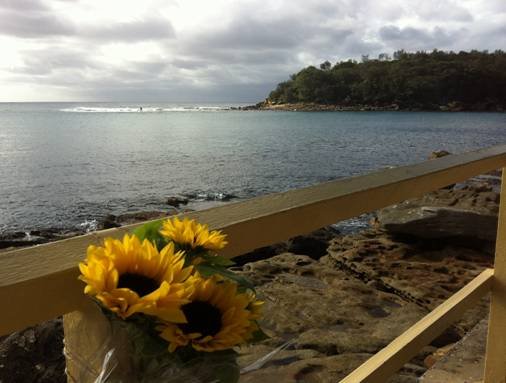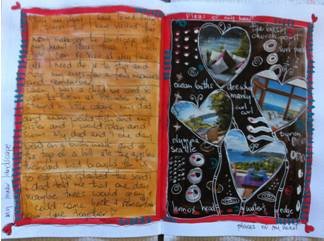|
Gold Coast Counselling and Life Coaching
Counselling for Individuals and Relationship
GRIEF COUNSELLING

No body ever told me, grief felt so like fear. C.S Lewis
For C.S Lewis, fear was the emotion that was experienced as he grieved after the loss. For each of us, we experience emotions and feelings unique to us. Perhaps we don't experience that fear, emotions can be very different. Perhaps we feel deep sadness or even numbness.
Whatever the situation is for you, if you have visited this page today, and are suffering from loss and are grieving, I extend my thoughts of loving kindness to you.
At some time or another, all of our lives will be touched by loss in some form or another. Grief is our response to loss, and it can be a very difficult emotion to bear.
Grief is a process... some call a journey
We experience grief when we face the death of a loved one,
but we also feel grief when we experience other forms of loss.
Loss such as that through; divorce, retrenchment, failing health, watching parents age and decline, the loss of a treasured pet,
loss of a home, financial loss, clearing out clutter,
a friend moving away, loss of personal items, changes in self through accident or ageing process, children moving away from home.
Responses to Grief.
The first response that we have to loss is grief. Grief is usually felt in the body. What you feel there may be no words for.
There may be the feeling that there is no air, that you can't breathe properly. There may be feelings of shock or numbness,
disbelief, that it can't be true.
A range of emotions can be present; sadness, anger,
disappointment, frustration, envy, resentment, bitterness, anxiety and confusion.
Grief can manifest in the body as;
heart palpitations, chest pain, stomach disturbances, headaches, urinary tract problems, irritable bowel, body aches and pains - just some of the body's messages that it needs our attention.
When we experience a very painful grief, it can appear similar to depression. It may be misunderstood by ourselves, the people who are closest to us in our lives, even by therapists.
"Grief is like the ocean, it comes on waves, ebbing and flowing.
Sometimes it is calm, and sometimes it is overwhelming.
All we can do is learn to swim." - Vicki Harrison.

Numbing the feelings associated with grief.
People often try to numb the feelings that arise with grief, in ways that may in the long run, cause harm. The feelings don't go away, they just get buried.
There are a wide range of ways that we can numb our feelings; keeping ourselves busy,
drinking too much, over or under eating, working long hours, risk taking activities, watching a lot of tv or videos,
gambling, shopping, drugs or sex.
None of these numbing techniques help in the long run and can prolong grief. You may have tried to share feelings with friends or family.
However, not everyone is comfortable sitting with feelings, and well meaning friends may tell you not to worry, or to get on with it.
Grieving - feeling your feelings - helping another
In order to move through our grief, we need to be present to, and honour our grieving process. This means, feeling our feelings whatever they are.
There is a way to experience our emotions without feeling swamped by them, or having to numb them, and that is a learned skill, one that I will share with you in our sessions together.
We are all unique and our grief is a unique process.
One response to the sadness of loss is crying. Tears are healing and it is OK to cry when we are sad.

Letting our feelings have an expression, giving those feelings a voice, telling our story, to someone who can sit and listen to the person who is grieving is part of the healing journey.
What is helpful is to have someone who can sit quietly and listen.
Journaling can be a great help, writing about our story, and, we also need someone else to be present to us, and hear our story.
Emotions
There is a way to sit with emotions, without them swamping us. It may be hard to believe when you are grieving, but emotions only last 90 seconds. Then they pass. What happens is if we keep telling scary stories in our heads, then the emotions can amplify. I can help you with this in session. It's a skill set, and is relatively easy to learn, and as you practice it becomes easier.
Mindfulness and The Grieving Process
"Mindfulness means paying attention in a particular way: on purpose, in the present moment, and non-judgmentally." Jon Kabat-Zinn Ph.D.
Mindfulness helps us to heal, and to deal with what is happening in our grief.
One of the most mindful things we can do, is to acknowledge that grief is present, rather than trying to pretend we are doing fine
or trying to stop feeling bad.
By being present to our emotions, and our body's messages,
our grief can ebb and flow. Through being mindful we can tend to our grief in a self caring, healthy way and support ourselves through the grieving process.
You can learn how to use mindfulness in the grief counselling session.
Sessions available all throughout Australia on Skype or WhatsApp.
In house at The Gold Coast Queensland, and online sessions.
Call today for an appointment: 0408 792 747
HOME
ANXIETY
CONTACT
MINDFULNESS
RELATIONSHIP
SITE MENU

Ashmore Counselling l Broadbeach Counselling l Coomera Counselling l
Hope Island Counselling l Helensvale Counselling l
Paradise Point Counselling l
Runaway Bay Counselling l
Gold Coast Counselling l
Surfers Paradise Counselling l
Too much of a drive? Book in for an online session. Click here.
|
